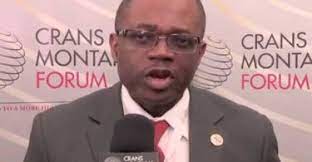… Says Lagos govt lacks coordination, absence of clear crisis plan
The President, Delreeve Konsult Limited and the former Director and Global Head of Communications and Events Management at Afreximbank, Obi Emekekwue, has expressed dissatisfaction over the level of crisis management response of the company purported to own the 21-storey building that recently collapsed in Lagos state.
Emekekwue, who spoke during the 2nd Jacksonites Professional Development Series (JPDS) seminar, said information not made available on such “huge” crisis situation is not a good way to manage crisis that borders on public safety. He added that “it is really very strange that the company [Fourscore Heights Limited] has not been in the limelight to at least provide information on their role in the building.”
The JPDS seminar series is organized by Jacksonites Worldwide Forum, an alumni association and professional development network of the Department of Mass Communication, University of Nigeria, Nsukka.
Delivering the lecture titled: “Crisis Survival in Today’s Viral World: The Communications Conundrum,” Emekekwue, who graduated from the Department in 1982, explained that during crisis situations, crisis communication should come from every party impacted by the incident base on their own role. He hinted that a good strategy the company – purported to own the 21-storey building – would have devised to effectively manage the crisis was to come out from the onset to provide vital details of their role and what they are doing to manage the crisis.
He noted that the Lagos state government also has responsibility to provide accurate information on the situation since it gave license to the company to build a skyscraper. But so far, Emekekwue said the situation is confusing as little has been done to provide the right information to the public, especially families of victims.
“At some points, it was said the building was approved for 15 floors and then it went up to 21 floors and then the same government turned around and said it was approved for 21 floors. At this point, from what I have read so far, there is nothing so definitive in terms of what was actually approved. It seems to be a bit confusing,” Emekekwue said.
“Somebody was sacked from office because of this incident but it is unclear why that happened. So, it shows lack of coordination, and absence of a clear crisis plans on the part of the government as well.”
The said 21-storey building collapsed on November 2. It has killed 46 people so far, including Femi Osibona who owned the building. Over 15 others survived with different degrees of injuries, while some others who are still trapped in the rubble are believed to have died.
According to him, an issue becomes a crisis when it is severe enough to affect a large number of an organization’s key stakeholders and to negatively impact its brand reputation, operations and the bottom line of business.
“A crisis situation can disrupt corporations, damage reputations, destroy shareholder value and trigger other threats. A crisis is a situation which every organization and every communications team must be prepare to handle at any moment. Crisis requires rapid, carefully thought out, and consistent response across channels,” he explained, stressing that “a corporate crisis can be one of the most difficult situations to navigate.”
Emekekwue, who has over 35 years professional experience across corporate strategic communications, media, public relations, and international civil service, therefore urged organizations and companies to invest in a crisis response and management programs so as to help surmount situations of crisis.
“Every organization, every company and every business must have a well thought out, well prepared, timely and frequently practiced crisis response and management plan. In order to be ready and able to stand inevitable crisis that is sure to happen sooner or later, the best is to invest in a crisis response and management program,” adding that “information and communication are important before, during and after a crisis.”
The Jacksonite Professional Development Series Steering Committee Chairman, Prof. Chinedu Mba of Algonquin College, Ottawa, Canada, noted that the lecture is relevant and that the committee and members involved in planning the professional development series are intentional in choosing themes for each session.
“The Jacksonites Professional Development Series is a capacity building initiative of the Jacksonites worldwide. The [team] is very intentional in choosing its themes for each session. And because we are very closely connected to the environment, we select seminars that are a reflection of the pressing need that are begging to be addressed.”
She continued, “Communication is the critical aspect of relationship management. And crisis, like change, is an intrinsicpart of life. Everyone faces crisis at some point or the other.”
Marcel Mbamalu, a veteran journalist and the Editor-in-Chief and Publisher of Prime Business Africa who moderated the lecture, said that the series was delivered at a time the role of communication to organizations prove difficult to clearly express as the traditional way of sharing information has changed.
“Today’s topic is an interesting topic bordering around social communication and we all know that the evolution of social communication is more like an open-ended evolution that is very difficult for us to begin to talk even about the definition,” Mbamalu said. “The role of communication to corporate bodies and societies is hard to articulate because source, receiver and platform no longer differ as we use to know them.”
Key industry experts, media managers and communication scholars attended the event including Barrister Kingsley Osodalor, renowned media expert and member, Nigerian Guild of Editors; Dr. Chidiebere Nwachukwu and Dr. Ijeoma Ajaero, lecturers, department of Mass Communication, University of Nigeria, Nsukka.
Saint Ekpali also contributed to this report.






